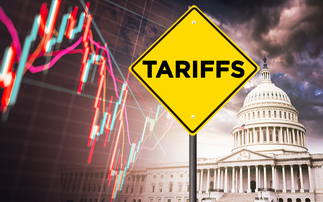This year has been a big year for the pensions industry. In the final part of this four-article series, James Phillips looks at what happened between October and December.
October
3 October - The Financial Conduct Authority (FCA) deems fewer than half of the defined benefit (DB) transfers it reviewed, where the recommendation was to transfer, to be suitable.
3 October - Fidelity International announces it will switch to a performance-based fee structure - also known as a fulcrum fee.
4 October - Royal Mail workers in the Communication Workers Union (CWU) vote for strike action over its proposal to shut its DB scheme.
5 October - Columbia Threadneedle Investment and the Pensions Policy Institute's annual The Future Book says master trust default funds do not adequately protect members from a potential market downturn.
10 October - Richard Thaler, author of auto-enrolment's (AE) inspiration Nudge, wins the Nobel Prize for Economics.
11 October - The Pensions and Lifetime Savings Association (PLSA) calls for national retirement targets to be set to help guide savers towards an adequate pension pot.
12 October - Lloyds Banking Group announces plans to buy Zurich's £15bn workplace pensions business and merge it with Scottish Widows.
12 October - The High Court blocks the CWU's planned strike against Royal Mail's planned DB scheme closure.
16 October - The United Nations-backed Principles for Responsible Investment warns many firms may lose their signatory status due to ‘greenwashing'
17 October - Inflation hits a five-year high of 3%, almost prompting Bank of England governor Mark Carney to write a letter to the Chancellor explaining why the 2% target had been overshot.
18 October - Parliament confirms the full membership of the Work and Pensions Committee (WPC), with four Labour MPs, five Conservative MPs, and one Scottish National Party MP alongside chairman Frank Field.
19 October - Pensions and financial inclusion minister Guy Opperman announces the DWP will take over the pensions dashboard project from the Treasury.
20 October - DWP director for private pensions and stewardship Charlotte Clark states any action arising from the DB green paper is unlikely to happen before 2020.
20 October - Richard Butcher takes over as chairman of the PLSA, pledging to open it up, while members agree an overhaul of its constitution.
23 October - The UK's pension system falls four places in the Melbourne Mercer Global Pension Index, after concerns of "major risks and/or shortcomings".
25 October - The government is defeated in the House of Lords after peers amend the Financial Guidance and Claims Bill to include provision for a cold-calling ban.
25 October - Government statistics reveal assets under management in the Local Government Pension Scheme hit £260bn in 2016/17.
26 October - The DWP announces plans to force trustees to disclose costs and charges information to members or face a £50,000 fine.
30 October - Willis Towers Watson research finds assets under management at the UK's 42 biggest asset managers fell £228bn in one year.
November
2 November - The Bank of England raises the base interest rate by 25 basis points to 0.5%, its first rate rise in more than a decade.
6 November - Broadstone Group acquires Mitchell Consulting and 2020 Trustees as part of a continuing acquisitions strategy.
7 November - HM Revenue and Customs updates its internal guidance on how DB schemes should approach Value-Added Tax (VAT), but fails to inform the industry.
9 November - Treasury minister Stephen Barclay tells the House of Commons that the cold-calling ban will enter parliament in early 2018.
13 November - TPR secures its first conviction under its AE non-compliance powers after Stotts Tours and Alan Stott pleaded guilty to a combined 16 offences.
16 November - Guy Opperman confirms there will be no changes to the AE charge cap, but a "clear case" for change is expected in 2020
17 November - The DWP reveals bridging pensions will be paid out according to the originating scheme rules when someone enters the PPF.
17 November - Universities UK proposes closing the Universities Superannuation Scheme to future accrual and moving all members to its DC arrangement in a move that shocks the sector.
22 November - A quiet Autumn Budget gets a mixed industry reaction, as Philip Hammond confirms the lifetime allowance will rise with the Consumer Prices Index, and reveals plans to improve schemes' abilities to invest in long-term infrastructure.
27 November - The WPC renews debate over defined ambition schemes, launching an inquiry into collective DC.
29 November - The FCA uses its competition enforcement powers for the first time and states Artemis Investment Management, Hargreave Hale, Newton Investment Management, and River & Mercantile Investment Management may have broken competition law.
The regulator alleges the four asset managers disclosed the price they intended to pay or accept such information, or both, in relation to Initial Public Offerings and placing before share prices were set.
30 November - The DWP unveils its plans for a master trust authorisation regime, with master trusts paying up to £67,000 and their staff needing to meet certain criteria to be approved.
December
4 December - British Airways (BA) Pensions suspends transfer values for all active members, citing an increased volume of enquiries as it consults on closing the New Airways Pension Scheme (NAPS).
5 December - The PPF publishes its 2017 edition of the Purple Book, revealing bond allocations had hit an all-time high by March 2017 while open DB schemes continued to decline in number.
5 December - The Organisation for Economic Co-operation and Development ranks the UK as the worst nation for mandatory retirement provision.
7 December - Xafinity announces plans to acquire Punter Southall, Punter Southall Investment Consulting and Punter Southall Administration in a £153m deal.
8 December - BA confirms it will close the NAPS to future accrual from 1 April 2018.
8 December - The Office for National Statistics (ONS) reveals life expectancy improvements were continuing to slow with updated mortality statistics.
11 December - The WPC calls for the cold-calling ban to be in place by June 2018 and for Pension Wise guidance to become the automatic path for anyone seeking to use the pension freedoms, in a report published after its inquiry into the reforms.
11 December - TPR announces a second prosecution attempt under its AE non-compliance powers, this time for a Birmingham-based healthcare company and its director.
12 December - Inflation climbs yet again, this time hitting a five-year high of 3.1%, causing Bank of England governor Mark Carney to write a letter to chancellor Philip Hammond explaining why it is so far over the 2% target.
13 December - Government statistics reveal more than nine million people have now been auto-enrolled into a pension.
13 December - A special WPC evidence session hears that British Steel Pension Scheme members may have end up in the PPF after difficulties encouraging them to move to a new scheme, despite trustees saying they had given "sufficient information" about the options available to members.
13 December - The Professional Trustee Standards Working Group unveils a set of six standards that professional trustees must adhere to from next year in a bid to improve governance.
14 December - The Scottish Government varies its income tax bands from the rest of the UK, moving to a six-band structure and potentially causing "chaos" for pensions tax relief.
18 December - The DWP publishes its much-anticipated review of AE, setting out plans to remove the lower earnings limit and extend the programme to 18-year-olds in the mid-2020s.








